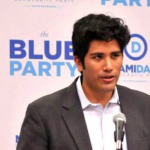Are nonpartisan municipal races a thing of the past?
The Democrats made them do it.
That’s what Nelson Diaz, chairman of the Miami-Dade Republican Party, said about an email they blasted Wednesday for Zoraida Barreiro, who is running in the special shotgun wedding election for the county commission district 5 seat vacated by her husband Bruno Barreiro, so he could run for Congress.
“Of course we’re going to help Zoraida,” Diaz told Ladra last week. “And you can blame the Democrats. My preference is not to do that. It’s important to have independent, free elections at the local level. But if Democrats are going to get involved to push their radical, left wing agenda, then we will get involved.”
the Democrats. My preference is not to do that. It’s important to have independent, free elections at the local level. But if Democrats are going to get involved to push their radical, left wing agenda, then we will get involved.”
And so they did.
“We Need to Stop the Democrats,” the email reads.
“The Democrats are trying to force a radical, left-wing liberal that just recently moved to Miami from out of state. She is so out of touch with our community, she has stated her support for the elimination of the Homestead exemption. If she wins, they will have enough Democrats to take down the tax deduction and it will increase our taxes,” it says, urging votes for Barreiro.
“We cannot allow the Democrat to win!”
Read related: Dems push full court press for Eileen Higgins in special District 5 county race
Sure sounds like a desperate cry — and Ladra is pretty sure Higgins would not advocate lifting the Homestead exemption, which isn’t the county commission’s purview anyway, but, hey, it’s a good tactic in the working class parts of the district: “Oh! My! God! She’s going to raise taxes!” It’s almost as good as “She’s a communist!”
Diaz said Higgins said as much in a Spanish-language TV interview. But la gringa — whose Spanish is okay but could be better — was only saying what many electeds at the county and cities are saying: That this additional exemption voters are likely to pass in November is going to drain government coffers and cause serious cuts. Government officials and sitting electeds everywhere are worried about that and planning.
“It must have been misinterpreted in my terrible Spanish,” Higgins said, adding that the county mayor has done a good job. “We have to plan for it. When we sit around meetings and say we want more buses we have to remember that when we vote in November.”
Democrats have been actively and publicly helping Eileen Higgins in this race since the very beginning. She was the only Democrat running against three Republicans, including former State Sen. Alex Diaz de la Portilla. The party paid political consultant Christian Ulvert, who took precious time from a gubernatorial candidate. And Higgins had local electeds, state reps and even another gubernatorial candidate endorse and promote her online.
She won the first round with 35%, two points over Barreiro, forcing a runoff. Democrats like to think they did that. After all, it’s not their first rodeo.
While it’s the first time the local GOP steps into a traditionally non-partisan municipal race, Diaz said, the local Dems have been involved in them since at least Daniella Levine-Cava ran for Miami-Dade Commission. Her race in 2014 against incumbent Lynda Bell, who happened to be a staunch right-to-life Republican, became the first local non partisan election the Miami-Dade Democratic Party got really involved in. Since then, they’ve helped Homestead Mayor Jeff Porter, Miami Beach Commissioner Micky Steinberg and Miami Commissioner Ken Russell.
Read related story: Eileen Higgins would upset the apple cart, add checks and balances
“We’ve always had the approach that if you’re running for office, who you affiliate yourself with, what party, speaks to the types of  decisions you’ll be making at the dais,” said Miami-Dade Democratic Party Chairman Juan Cuba. “Even though it’s local, we’re dealing with zoning and services. And you also deal at the local level with national issues — minimum wage, affordable housing, police oversight.”
decisions you’ll be making at the dais,” said Miami-Dade Democratic Party Chairman Juan Cuba. “Even though it’s local, we’re dealing with zoning and services. And you also deal at the local level with national issues — minimum wage, affordable housing, police oversight.”
Sanctuary cities. Gender-neutral bathrooms.
“We do want to make sure we are electing people who align with our values, especially at the local level where we need more people who will fight for working families,” Cuba said.
The Miami-Dade Commission already has a Democrat majority. And that doesn’t necessarily translate to a “progressive agenda” when it comes to the votes. The mega mall development, for example, was passed with Levine-Cava as the sole dissenting vote. In fact, that happens to her a lot. And the ordinance to hold immigrant detainees for ICE — to remove Miami from the list of sanctuary cities and please Donald Trump — was sponsored by Sally Heyman, a Democrat and former state rep.
On the flip side, Mayor Carlos Gimenez endorsed Hillary Clinton — though one could argue that was a publicity stunt since his son works for Trump — and Commissioner Jose “Pepe” Diaz, another Republican, is very friendly to labor, which is usually a Democrat characteristic. Barreiro has long been considered a moderate Republican because he pioneered LGBT issues. But he represents Miami Beach, so maybe he sorta had to.
Read related: Lynda Bell vs. Levine-Cava debate becomes heated spar
Levine-Cava, the first Democrat elected to the  commission with the party’s help, says she doesn’t see the commission as a partisan body. “It’s more about local issues and quality of life. Transit is not a Democrat or a Republican issue,” she told Ladra.
commission with the party’s help, says she doesn’t see the commission as a partisan body. “It’s more about local issues and quality of life. Transit is not a Democrat or a Republican issue,” she told Ladra.
Well, maybe not. But let’s bring up the idea of raising taxes for it or having special taxing districts and you will see partisan division.
Some people fear that this marks the end of nonpartisan races in Miami-Dade and they could be right. Florida law requires judicial candidates to stay non-partisan, but how much you wanna bet that we know who is a Republican and who is a Dem. Candidates in the big cities like Miami Beach and Homestead are already using the invisible “D” and “R”behind their names for campaigning. Small cities are likely next in an increasingly divided and polarized political society.

